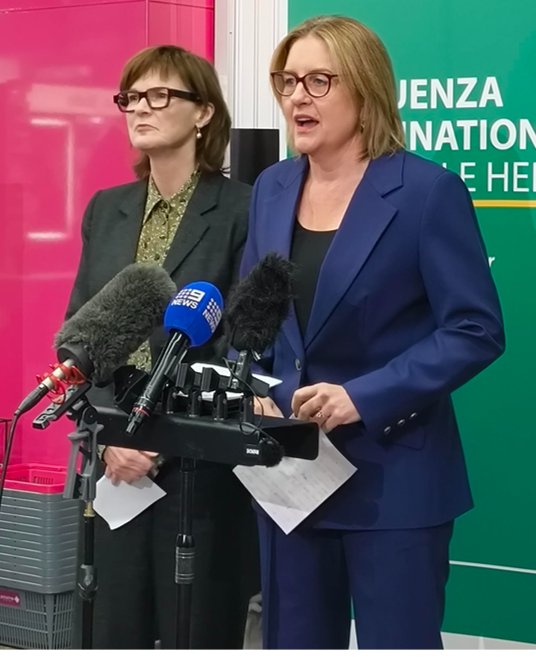PSA Faye McMillan Conference Grants awarded for 2025
28 May 2025
In marking National Reconciliation Week from 27 May to 3 June 2025, the Pharmaceutical Society of Australia (PSA) has announced the recipients of the third annual PSA Faye McMillan Conference Grant, supporting the continued professional development of First Nations pharmacists and pharmacy students.
Inspired and supported by Professor McMillan herself, the PSA Faye McMillan Conference Grant is awarded to Aboriginal and/or Torres Strait Islander pharmacists or pharmacy students to attend the PSA National Conference in Sydney from 1-3 August 2025.
Professor Faye McMillan AM is a Wiradjuri yinaa (woman) originally from Trangie, NSW. She is a dedicated community pharmacist and is recognised as the first Indigenous Australian to hold a western degree in pharmacy in this country.
Thanks to the generosity of this year’s grant sponsors the Australian Pharmacy Council (APC), Care Pharmaceuticals and Hydralyte, and AstraZeneca, PSA is proudly supporting four pharmacy students to attend PSA25.
The recipients of the 2025 PSA Faye McMillan Conference Grant are:
- Noah Gregory
- Samantha Forrest
- Peter Cradick
- Shi-Anne Wallace
Quotes attributable to PSA/NACCHO Aboriginal and Torres Strait Islander Pharmacy Practice Community of Specialty Interest Chair Ms Chastina Heck MPS
“This year we are supporting the theme of National Reconciliation Week, ‘Bridging Now to Next’, empowering our next generation of First Nations pharmacists with invaluable networking and leadership development that PSA25 offers.
“Building on Faye’s legacy of excellence in the pharmacy profession, we are valuing the role the next generation plays as agents of change for the future.”
Quotes attributable to Professor Faye McMillan AM
“I am honoured again to partner with PSA to ensure that First Nations peoples are being embraced by the pharmacy profession. Congratulations to all recipients of the conference grant, I hope you enjoy PSA25.”
Quotes attributable to Alexis Wormleaton – Brand Manager Hydralyte, Care Pharmaceutics and Hydralyte
“Care Pharmaceuticals are proud sponsors of the PSA Faye McMillan Grant, recognising the remarkable achievements of Indigenous pharmacists like Professor Faye McMillan in advancing healthcare equity.
“As leading providers of innovative healthcare solutions for Australian families, Care Pharmaceuticals and Hydralyte are honoured to again sponsor the PSA Faye McMillan Grant. This sponsorship reflects our commitment to empowering future Aboriginal and Torres Strait Islander pharmacists to attend the PSA National Conference, contributing to discussions on improving Indigenous healthcare.
“We are so happy to be partnering with PSA on this grant for the second year in a row and hope to do so for many years to come.”
Quotes attributable to Ben McDonald, Country President AstraZeneca Australia and New Zealand
“Pharmacists play a pivotal role to ensure accessibility and quality of care. Increasing the number of pharmacists from Aboriginal and Torres Strait Islander backgrounds will enhance the provision of culturally sensitive services.
“AstraZeneca is committed to nurturing the growth and leadership of First Nations pharmacists. By collaborating with the Pharmaceutical Society of Australia through the Faye McMillan Conference Grant, we are supporting the future of healthcare that represents and serves all Australians.”
Quotes attributable to Bronwyn Clark, Chief Executive Officer – Australian Pharmacy Council (APC)
“APC strongly advocates for amplifying Indigenous voices in pharmacy and is committed to a health system free of racism and discrimination by contributing to a culturally safe pharmacy workforce. We do this through partnering with Aboriginal and Torres Strait Islander and Māori peoples to ensure their voice is heard through the work of our Indigenous Health Strategy Group.
“The APC LIPPE™ (Leaders in Indigenous Pharmacy Professions Education) Network, a partnership between APC and the Council of Pharmacy Schools (Australia and New Zealand) was born out of a joint vision between Professor McMillan AM and myself. This network aims to transform the pharmacist workforce by enabling Indigenous leadership in the delivery of pharmacist education and the practice of pharmacy. We are delighted to be supporting this grant for 2025.”
Media contact: Georgia Clarke M: 0480 099 798 E: georgia.clarke@psa.org.au


